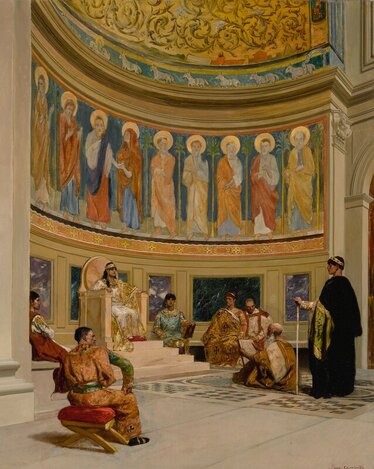|
Saint John Chrysostom (Archbishop of Constantinople) Exiled by Empress Eudoxia By Jean-Joseph Benjamin-Constant (1845-1902) Motto: "Fight the good fight of faith, lay hold on eternal life, whereunto thou art also called" (1Timothy 6:12a) John, God’s fellow worker (1 Corinthians 3:9) and one amongst those who have built on the foundation of the Church (1 Corinthians 3:10), earned his fame as a master of speech through the nickname given by his coevals “Golden Mouthed.” This nickname (Greek- Chrysostom) appeared for the first time in what is today known as the Constitution of Pope Vigilius (cf. P.L., LX, 217) in the year 553. Chrysostom is generally considered the most prominent “doctor” of the Greek Church (Orthodox) and the greatest preacher who was ever heard from the pulpit. His natural gifts, together with the external circumstances contributed to the person he was. Whether he indeed had a golden mouth, it is subject to his coeval’s judgement. Whether his service and work were “golden” (1 Corinthians 3:10-15), will be revealed in the Day of the Lord, in whose coming he set all his hope, not in men. For from men he oftentimes received much disappointment, evil schemes, betrayals, unfair trials, and sufferings that eventually led to his death (Jeremiah 17:9). However, for a true athlete of Christ, nothing should ever constitute an impediment for preaching and a reason for losing heart, but rather a challenge and an impetus for fighting. Chrysostom always proved himself courageous and tireless. It is not with earthly weapons that he fought with, but with those sharpened and strengthened by the Lord Himself, meant to destroy every fortress of the human mind and soul that opposes the Truth and the knowledge of God (2 Corinthians 10:4-5). He proved himself to be a true fighter and even more, a conqueror! For the power of God has been proven in his life throughout all the struggles and battles that were beyond human power to handle (2 Corinthians 12:9-10). In one life lived to an extreme intensity, he fought on two fronts. Firstly, he fought to achieve holiness. After he conquered every opposition of the flesh (nature) and defeated every enemy and obstacle in his way towards heavens, he started another fight: the fight for the Church of Christ with the entire multitude of believers, to the highest steps of holiness and Christian purity (Virgil Gheorghiu. Saint Jean Bouche d'Or, “Hommes de Dieu,” Librairie Pion. 1957, © Editions du Rocher). ⁂⁂⁂ John Chrysostom was born somewhere between the years 345 and 349, in Antioch, on the River Orontes, in the capital of the Roman province of Syria (today Antakya, Turkey). He belonged to a rich family. His father was a superior officer, Magister Militum Orientis, a commander of the Roman Chivalry in Syria. The only thing known about him is that his name was Secundus. Historians did not mention his other two or three names, as it was in the Roman custom of the time, but have chosen the Greek custom, which was more strongly rooted in the hellenised society of the Eastern parts of the Roman Empire. The same applies for John. Secundus, who was more advanced in years, married a young woman of only 16 from Antioch, Anthusa. Their first child was a daughter, whose name remains unknown. Their second child was John. General Secundus died shortly after John was born. Anthusa was then left alone to raise two children before she turned 20. They lived together with one of Secundus’ sisters, Sabiniana, who, later on, stood by John’s side in the most difficult moments of his life (during his exile), despite her being 80 years old. Refusing to remarry, Anthusa dedicated the rest of her life to raising the two children and managing the fortune she inherited from her late husband. Despite being very young and inexperienced, she succeeded. In later years, John recalled how she confessed the struggles she went through as a widow: “You can never reproach me for lessening the possessions your father left you despite the challenges and dangers widowhood brings by, which for so many women had tragic consequences. I have kept for you all these things in their integrity, even though I spared nothing in order to give you a solid and brilliant education” (John Chrysostome. On Priesthood/De Sarcedotio, book I). John’s biographers often mention his mother as being a very pious Christian woman. Antioch, the city where John saw daylight for the first time, was at the time one of the most emblematic cities of Europe. Yes, it is no confusion! At the time, Europe was considered to include all cities that adhered to the Greek and Roman culture and civilization. During John Chrysostom’s time, the borders of Europe were placed on the Euphrates; Syria, Egypt, and Asia Minor were integral parts of it. When the Apostle Paul and the other apostles of Christ were preaching in the areas of Asia Minor, of Cappadocia, in the cities of Antioch or Ephesus and all the other cities we read about in the New Testament. They all belonged to Europe and were the full expression of the Greek and Roman civilization. Concerning the history of Antioch, the city was founded by one the former generals of Alexander the Great, Seleucus I Nicator, approximately 650 years before the birth of John. The fact that John was born in this city that took pride in being called the Pearl of the East or The City of Gold, has played an important role in influencing his personality. It was at the time one of the most beautiful cities in the world and the third in importance in the Roman Empire, after Rome and the Egyptian Alexandria. It was also the general headquarters of the imperial army in Syria and whose attributes were to defend the Eastern borders against the attacks of the powerful and tireless enemy: the Persian Empire. The city was home to approximately 500,000 people, was beautified with numerous and imposing temples, aqueducts, theatres, and public baths which were encouraged through direct subsidies from the Roman Emperors. Herod, the Roman-appointed king of Judaea, also contributed to the adornment of this city with two porticos (Greek: stoa) and a marble pavement. If it is necessary to recall another of the many ironies of history, allowed by the Lord, it is worth mentioning the fact that after the destruction of Jerusalem and the exile of the Jews, Antioch was adorned by the future Emperor Titus with the Seraphims taken as war prey from the Temple! Antioch was the first city in history that enjoyed public illumination on its streets, beginning with the 4th century AD. This is recorded by Libanus (314-393 AD), a great pagan intellectual, who in his panegyric called Antiochikos (Oration 11) brought praise to his city of birth (according the John Wilkes. Encyclopedia Londinensis. volume 12, 1814, p. 119; A.F. Norman. Antioch as a Centre of Hellenic Culture, as Observed by Libanus. Liverpool University Press, 1st edition, 2001). However, the most important and glorious page in the history of Antioch is the fact that the Church of Antioch was founded by the Apostles of our Lord Jesus themselves! Here preaching and bringing the Good News, the Gospel, the Apostles Peter, Paul, and Barnabas. Also, it was here the followers of Christ were called Christians for the first time (Acts 11:26). Until then, they were known as “Nazarenes” or “Galileans.” After these short presentations/descriptions we can imagine, to a certain extent, the rhythms of the daily lives as well as the atmosphere and the air that John Chrysostom breathed in the fortress of Antioch, where the majority of the population was Christian. We can safely assume that a great part of John’s personality is a reflection of the brilliance and the spiritual elevation of Antioch. But, concerning his intellectual maturity and edification, the most important contribution was brought by the most appreciated and highly esteemed professor in the Roman Empire, the rhetorician Libanius. After leaving Antioch in his early youth in order to finish his studies in Athens, Libanius arrived in Constantinople, where he became the leader of the most renowned school of rhetoric. His success triggered the envy of some -- especially his former professor, Bernarchius, who falsely accused him of sorcery and witchcraft. This was a reason for which the prefect of the city would eventually bash Libanius in 346 AD. He then arrived in Nicea where, after a short residence, left for Nicomedia. He remained there for five years and gained a solid reputation. At the call of the Emperor Julian the Apostate, who frequently audited his speeches, he returned for Constantinople where, after a short period of time, he was again forced to leave due to the hostility he faced in the city. This time he came back to his place of birth, the city of Antioch, where he opened a school of rhetoric. This was an opportunity Anthusa did not dare to lose, so she offered her son the best possible education. At around the age of 18, John started participating in the classes of the famous sophist. The intellectual capacity and the genius of this young man stirred the admiration of his master. According to the church historian Sozomenus, Libanius was asked on his deathbed which one of his students would deserve to take his place. He then regretfully answered: “John, if it weren’t for the Christians who stole him from us.” (Sox. H.E. lib. Viii. c2). When John started to practice law, his rhetorical talent was quickly noticed. His speeches were listened to with great joy and admiration by Libanius himself, a giant of rhetoric. All conditions were set for a brilliant future of a judicial career and an exceptional social status: fame, fortune, and a high position in society. However, something even greater than his convictions, his plans and extremely favourable circumstances started to take over his heart. A state of detachment from all these things, a transformation in his own perceptions and convictions invaded his being. This was similar to Paul, another young man from Tarsus in the neighbouring Cilicia, whom John started to view these things as a “loss,” as absolutely worthless (Philippians 3:7) compared to the treasure unhoped for. The everlasting happiness of an eternal kingdom with Jesus Christ, the Lord (Matthew 13:44), The One whose “incomprehensible riches” (Ephesians 3:8) await those who accept Him as Lord and Emperor, then become full citizens of Heaven (Ephesians 2:6,19; Philippians 3:20). The gentle, reinvigorating breeze coming from far back in time, from the endless plane of eternity reached him and caressed his entire being. “The mystery that has been kept hidden for ages and generations” finally arrived and revealed itself to him: Christ was in his heart who brought to life the “hope of the eternal glory” with God (Colossians 1:26-27). Of course, it is only the elevated “flight” of his eloquence possessed only by him, which could help carry us on the wings of his thoughts, reaching that pleasant tranquillity of his soul and understanding the absence of any existential fear and peace that took over his entire being. It is so similar to the peace Adam and Eve enjoyed before they knew sin, while they were talking to God in the cool evening breeze (Genesis 3:8). John was, of course not in heaven, but he could taste it already. His master Libanius unfortunately never reached that experience, being too full of himself and his convictions, too rooted in his own philosophical nostalgias. He was one of the last coryphée of paganism, from which he could never depart. Maybe it was also because he, throughout his entire career, was never preoccupied with anything other than finding carefully crafted verbal formulas with an appearance of truth, rather than pursuing truth itself (he was a fully dedicated sophist!). Libanius took pleasure in his own word games that ensured him great popularity, games that eventually became his second nature. He was not ready to denounce his comfort in thinking to declare all that he was chasing “vanity and chase for the wind.” Had he been more rigorous in his research and honest to himself, he would have recognized that his entire life was nothing but a compromise and that his soul needed something completely different, something that neither rhetoric nor pagan rituals could bring. John had the courage to confront his master, in the beginning at least in principle (Job 32:6-9) by accepting to research other sources, outside his master’s manuals. He chose to research what the humble and ever more numerous Christians were believing. Eventually, this led him to denounce the disappointments of an imposed conventionalism and word games, while allowing him to discover “the word of truth” (Ephesians 1:13). Had Libanius renounced his pride (self-sufficiency) coming from his authority and fame (Job 32:9), he could have reached the conclusion that he was not a master of the truth, but that truth itself is free from any confinements of the human mind and does not subdue the mind and heart, but frees them! (John 8:31-32). John became, therefore, disappointed in the legal career he chose, despite his quick rise to fame. He knew very well what all these compromises meant and oftentimes he covered the truth by crafty speeches: “his soul revolted at the contrast between the purity of the gospel standard and the baseness of the aims and viciousness of the practices prevalent in the profession he had chosen. To accept a fee for making the worse appear the better case seemed to his generous and guileless soul to be bribed to lie- to take satan’s wages- to sin against his own soul!” (Wace, Henry. Dictionary of Christian Biography and Literature). To be continued...
0 Comments
Leave a Reply. |
Archives
May 2024
DisclaimerThe views, information, and opinions expressed in this website are solely those of the individual contributors and do not necessarily represent those of TRINICY International. Categories
All
|
Content |
Programs |
© COPYRIGHT 2018-2023
ALL RIGHTS RESERVED. |


